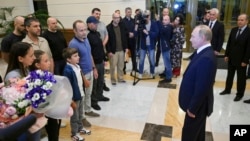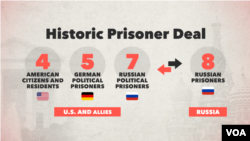U.S. newspapers were flooded with celebratory headlines last week on a historic prisoner swap with Russia that freed unjustly detained journalists and rights activists, including two American journalists.
But thousands of miles away, Russian state-controlled and pro-Kremlin outlets are covering the deal very differently.
Moscow sent a directive to those outlets advising them on how to cover the swap, the independent Russian outlet Meduza reported. The memo’s instructions include minimizing the significance of the exchange and presenting the political prisoners Moscow released as “superfluous” criminals.
“It reveals a lot of things we already know — that Russian state media works for one person, and whatever’s best for that one person is what they’re going to report,” Darren Linvill, co-director of Clemson University’s Media Forensics Hub, told VOA about the memo.
The Guardian’s media columnist Margaret Sullivan agreed, saying it’s expected that Russian state media will present the swap as a domestic victory.
“Russian media is very controlled, and the message that will come across is this is a huge win, that Russia didn’t give up anything important, that we got back people that have served us well,” Sullivan told VOA.
“They’ll spin it as a major victory, and that won’t be too surprising to see,” added Sullivan, who serves as executive director at the Craig Newmark Center for Journalism Ethics and Security at Columbia University.
The Kremlin directive recommended listing the names of the political prisoners released from Russia, along with their convictions and prison sentences.
Those released included American journalists Evan Gershkovich and Alsu Kurmasheva, both of whom were convicted on charges that were widely viewed as politically motivated and baseless.
Former U.S. Marine Paul Whelan and U.S. permanent resident Vladimir Kara-Murza, the latter of whom is a prominent Russian political activist and columnist, were also freed from Russian prison. The deal also included five wrongfully detained Germans, and seven Russian political prisoners held by Moscow. Many of them were jailed for criticizing Moscow or Russia’s 2022 full-scale invasion in Ukraine.
In one English-language article by the Russian state-owned outlet Sputnik International, former Marine and convicted sex offender Scott Ritter, who now regularly appears on Russian state propaganda, falsely claimed that some of those released from Russian prison were CIA assets.
Russia’s Embassy in Washington did not immediately reply to VOA’s email requesting comment for this story.
The Kremlin memo instructed state media to depict the eight people returned to Russia in the swap as being people who “worked for the Motherland.” In the case of Vadim Krasikov — who was serving a life sentence in Germany for killing a Chechen dissident in a Berlin park — the memo recommended underlining that he “eliminated an enemy field commander.”
“The Russian Federation will not leave me to rot in jail,” the murderer once told a guard.
The portrayal of the Russians whom President Vladimir Putin personally welcomed back last week as heroes is “Russian propaganda 101,” Linvill said.
The reality is those returned were convicted or arrested on clear evidence of crimes ranging from cybercrime to espionage and murder.
“Russia right now is in the middle of the ‘Second Great Patriotic War,’” Linvill said, referencing the war in Ukraine. “And the ‘Second Great Patriotic War’ is looking for heroes.”
Russia refers to World War II as the Great Patriotic War, which the former Soviet government and current government have long used for propaganda purposes.
In recent days, Russian state outlets like Tass, RT and Sputnik also appeared to amplify former U.S. President Donald Trump’s comments about the swap, Linvill said.
Trump congratulated Putin on “another great deal” and described the U.S. negotiations as “an embarrassment.”
“I got back many hostages, and gave the opposing Country NOTHING – and never any cash. To do so is bad precedent for the future,” he wrote on social media.
At least four cases under Trump involved the release of people held in U.S. prison in exchange for Americans detained abroad.
Linvill said that the Russian state coverage he has seen presents the swap as a victory for Russia. But the disinformation expert added that overall, he has seen less coverage than he expected, which speaks to the Kremlin’s directive to minimize the swap’s importance.
“Putin doesn't want to leave any room for questioning his wisdom,” he said.
It’s hard to tell just how much propaganda value the swap may have in Russia, Linvill said. “There’s always a little bit of reading the tea leaves when you’re trying to understand Russian propaganda and disinformation, and the fact that they’re downplaying it suggests that it doesn’t have broad value,” he said.
Still, Linvill added the swap likely does have value for Russia’s political elite, as well as would-be operatives who can take the exchange as a sign that Moscow would seek their return if they’re captured abroad.

